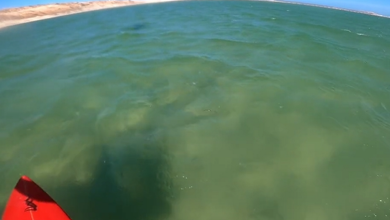Paul Watson: Anti-whaling activist arrested in Greenland faces extradition to Japan, CPWF says

Markus Schreiber/AP
Paul Watson, then founder and president of the animal rights and environmental group Sea Shepherd Conservation, in Berlin, Germany, on May 23, 2012.
CNN
—
Veteran environmentalist Paul Watson was arrested Sunday in Greenland and faces possible extradition to Japan, allegedly for his anti-whaling activities in the Antarctic years ago, his organization said in a statement.
The 73-year-old dual Canadian-American national was arrested by police when his ship docked in Nuuk, the capital of Greenland, to refuel, according to the Captain Paul Watson Foundation (CPWF) and the Greenland Police.
The John Paul DeJoria ship and a 25-member crew were en route from Dublin, Ireland, to the North Pacific to intercept the new $48 million Japanese whaling ship, the Kangei Maru, the CPWF said.
“We were immediately approached by a SWAT team and…police who wasted no time in handcuffing Paul Watson, our founder, and arresting him based on a decades-old Red Notice at the request of Japan,” the ship’s operations manager Locky MacLean said in a video message aboard the John Paul DeJoria.
In the video, police can be seen boarding the vessel and taking Watson away in handcuffs.
In a statement, Greenlandic police said they arrested Watson upon his arrival in Nuuk on the basis of a Japanese arrest warrant. He will be brought before a district court with a request to be detained pending a decision on his possible extradition to Japan, the police added.
His foundation believes the arrest “is linked to a previous red notice issued for Watson’s anti-whaling activities in the Antarctic.”
“This development is surprising, as the Foundation’s lawyers had announced that the Red Notice had been withdrawn. However, it appears that Japan made the notice confidential to facilitate Paul’s travel for arrest,” the statement continued.
The CPWF said it “believes that the reactivation of the red notice against Captain Watson is politically motivated, coinciding with the launch of the new factory ship.”
The Japan Coast Guard (JCG) told CNN it was aware that the Greenland Police had issued a statement about Watson and said, “We will continue to respond appropriately in coordination and cooperation with relevant organizations.”
Interpol issued a red notice for Watson in September 2012, two years after the JCG issued an arrest warrant for him. CNN has reached out to Interpol for more information.
An early member of Greenpeace, Watson later founded the Sea Shepherd Conservation Society, an environmental group known for tracking, exposing and sometimes ramming Japanese whalers. His attempts to disrupt Japanese whalers at sea earned him fame on Animal Planet’s “Whale Wars” television show.
His activities have also landed him in legal trouble. In 2012, he was arrested in Germany on an international arrest warrant issued by Costa Rica, which accused him of endangering a fishing boat off the coast of Guatemala in 2002. He jumped bail but denied any wrongdoing in the case.
In 2013, the Japan Cetacean Research Institute and the Japanese company Kyodo Senpaku Kaisha obtained an injunction from the U.S. District Court against Watson and Sea Shepherd, prohibiting him and his group from coming within 500 meters of the plaintiffs on the high seas.
As a result of the injunction, Watson resigned as president and chief executive of the conservation society in the United States and as president of the society in Australia.
In June, Kyodo Senpaku launched a brand new whaling “mother ship” – the Kangei Maru – a 370-foot, 9,300-ton vessel equipped with state-of-the-art drones capable of traveling about 100 kilometers (62 miles) to allow crews to quickly locate and kill whales.
The new ship replaces the Nisshin Maru, the infamous whaling factory ship dubbed by activists the “floating slaughterhouse” that was decommissioned in 2020 after more than 30 years of service, during which it frequently clashed with anti-whaling activists.
Watson told CNN ahead of the launch that he believes the ship’s high-performance features — including a cruising range of 13,000 kilometers (more than 8,000 miles) and its ability to sail for up to 60 days — suggest Japan could set its sights on whales well beyond its northern waters.
“Japan has never given up on its whaling ambitions,” Watson told CNN at the time. “The whole purpose of a ship like that is to be able to sail long distances … to hunt whales.”
Japan is one of three countries, along with Norway and Iceland, that still hunts whales. Officials say the industry is an important part of its culture and history, and also ensures its food security.
The Kangei Maru has a hold large enough to transport 85-foot whales from the sea, which leads to an interior butchering deck the size of two basketball courts.
There, workers will remove the blubber before carving the whale meat on huge cutting boards, before vacuum-packing and storing the meat in 40 industrial freezers, ready to be sold.
Takaaki Sakamoto, director of the Japanese Fisheries Agency’s Whaling Affairs Bureau, told CNN that Japan sent ships to the Antarctic last year to collect numbers and surface skin samples, but those expeditions did not involve killing whales. He added that they plan to return this year to do the same thing.
Hideki Tokoro, president of Kyodo Senpaku, told CNN that the Kangei Maru has no plans to kill whales beyond Japanese waters because it makes no economic sense.
Commercial whaling was banned under a 1986 International Whaling Commission moratorium. But Japan has used a loophole to continue legally hunting whales for scientific research, he said.
In 2018, it announced its withdrawal from the IWC and resumed commercial whaling a few months later, in defiance of international criticism.
“We are proud to capture whales and are very proud of this vessel which will allow us to begin whaling on the high seas this year,” Tokoro told reporters in June.



